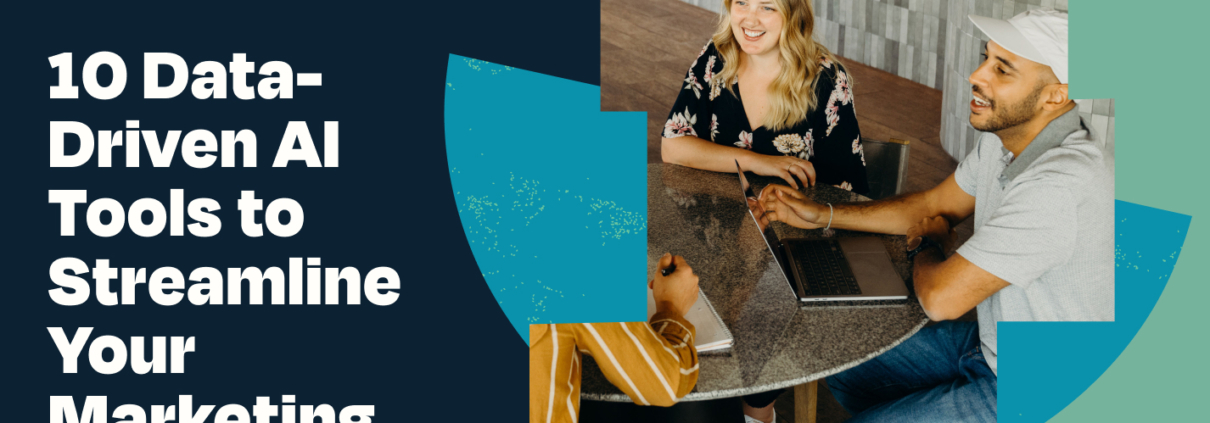10 Data-Driven AI Tools to Streamline Your Marketing Efforts
Attention, growth minded marketing leaders! As you look for ways to automate processes, increase campaign effectiveness, and scale your business, AI marketing tools should be at the top of your list.
Why? AI tools supercharge efficiency.
With AI, tedious and time-intensive tasks are automated or greatly sped up. The result? Teams have room to focus on strategy and big-picture tasks instead of being bogged down.
Don’t just take our word for it. As Gartner CMO predictions hint, “ By 2025, organizations that use AI across the marketing function will shift 75% of their staff’s operations from production to more strategic activities.
As a growth marketing agency, There’s a lot to be gained from integrating AI marketing tools into your marketing efforts. So scroll on to get acquainted with some of the top tools CMOs should know about.
How Marketers Should Evaluate and Select AI Tools
We’ll dive into the helpful (and potentially game-changing) AI tools shortly. But, allow us a moment to discuss proper tool selection. After all, there’s no shortage of AI tools on the market. And with the arrival of ChatGPT and the ensuing buzz among marketers, the tool options are only growing.
How do you sift through the noise?
Use these steps to find tools that align with business goals, budget, and team structure.
Establish Clear Goals
Before stepping foot into the vast marketplace of AI marketing tools, define your business goal. Are you hoping to:
- Improve customer engagement?
- Optimize a process?
- Increase content output?
- Automate repetitive tasks?
Once you know exactly what problem you need solved, the range of options shrinks from overwhelming to more manageable. For example, say a head of growth wants to increase content production efficiency and sets a goal of reducing the time it takes to create and publish content by 30%. In light of this, turning to tools that center on:
- Content editing
- Content scheduling
- Content optimization
While knowing the goal is crucial, there’s still more to consider.
Research Available Integrations
AI tools should make your life easier. So it’s crucial to evaluate one based on how it would fit into You deserve an AI tool that plays well with others 🤝.
If there are certain tools your team uses and relies on heavily, ensure your potential AI marketing tools can integrate with them. For example, if you already rely on a marketing automation platform like Marketo, you could start your search by looking for tools that have direct integrations with Marekto. Ask things like:
- Are there costs attached to integrating the tool with our systems?
- Are there APIs or webhooks available for custom integrations?
- How well does the tool’s API integrate with our current tools?
Ease of integration is another metric you can use when evaluating tools. White some tools are out of the box integrations, others may demand technical work to fully integrate. So determine what resources your team can set aside for integration and decide accordingly.
Consider The Learning Curve
A lot of AI marketing tools boast ease of use and intuitive platforms. But it’s still essential to determine how steep the learning curve for the tool will be. Look to the tool to see if onboarding materials are provided and whether there is a support system for troubleshooting in case problems arise 🤖.
Here are a few handy questions to keep in mind when evaluating AI tools:
- Can this AI tool be used by marketers without extensive technical knowledge?
- What type of technical support is offered and how quickly can issues be resolved?
- How much time is required to integrate the tool into existing workflows?
Evaluate Scalability
Your business (and your tech stack) will continue to evolve. For this reason, keep an eye on the future 🔮as you evaluate AI marketing tools. Consider the tools in light of long-term plans and decide whether they are built to scale. Ask questions like:
- Is this tool built to handle large amounts of data as our customer base grows?
- Does the tool offer enough flexibility to work with new channels we’re planning to integrate with in the future?
- Are there customization options and features that can change as our business needs change?
10 AI Marketing Tools For Growth Minded Marketers
What time is it? Tool time!
Whether you want to create hyper-personalized customer experiences, turn tedious tasks into automated ones, help scale content production, or all of the above, the AI tools on this list can help.
AI Marketing Tools for Personalization
It’s no secret that data is a marketer’s best friend. Dynamic Yield analyzes it in real-time using machine learning algorithms and then serves up personalized customer experiences.
What it is: A self-training AI-powered system that determines buyer intent from customer data. It delivers tailored experiences across channels including web, mobile, and mobile apps. So based on their past behavior, preferences, and purchase history, a customer will receive specific content and product recommendations.
Noteworthy feature: In addition to delivering hyper-personalized content, Dynamic Yield offers ReccomendML. This feature utilizes a deep-learning model to rapidly analyze large amounts of data and recommend ideal products to users.
Integrations: Dynamic Yield labels itself as platform agnostic, promising to integrate easily with your existing tech stack. The open API makes for seamless integrations with popular tools including GoogleAds, Klaviyo, Magento, and Mailchimp.
Designed with e-commerce companies in mind, Nosto puts machine learning algorithms to use, drilling into customer behavior to provide personalized digital experiences. The platform makes launching integrated experiences both quick and easy, no drawn out implementation needed.
What it is: An AI tool that optimizes that allows marketing teams to quickly segment audiences, A/B test for optimizations, and curate personalized shopping journeys based on actionable data. Unlike Dynamic Yield, it’s specifically designed for ecommerce and is known for its ease of use.
Noteworthy feature: Nosto offers omnichannel integration so brands can deliver tailored experiences via email, mobile and even in-store. Users enjoy the platform’s dynamic bundles feature which is designed to make upsell and cross sell actions seamless, increasing AOV.
Integrations: Integration headaches? Not with Nosto. It integrates well with a large list of e-commerce tools: BigCommerce, Magento, and Shopify to name a few. Plus, the tool prides itself on “ easy migration, risk-free deployment and fast time-to-market”.
Natural Language Processing (NLP) Tools
For a chatbot that doesn’t feel like a bot, look to Drift. The custom chatbot software offers engaging messages to site visitors and works to qualify leads, moving them along the pipeline.
What it is: Drift is a conversational AI chatbot that can understand and interact with customers in real time. It utilizes natural language processing (NLP) to deliver custom responses and understand user intent. The result is more tailored conversations and better user experiences.
Noteworthy feature: When it comes to this AI chatbot, use cases abound for sales and marketing teams. The ABM campaign capabilities, for instance, allow marketing teams to target important accounts and decision makers with well-timed and specific content. Generic messages, be damned. The tool also offers granular reporting so CMOs can track key metrics.
Integrations: There are multiple ways to integrate your tech stack with Drift. The platform’s integration directory involves the usual suspects like Salesforce, Clearbit, and Salesloft. But Drift 🤝Zapier work hand in hand, allowing users to connect with thousands of apps.
Making sense of unstructured data just got easier. MonkeyLearn can take in large amounts of customer feedback then analyze and classify it to provide insights into customer sentiment, highlight trends, and more.
What it is: MonkeyLearn is an NLP tool that automates text analysis processes with the help of machine learning models. It offers all in one text analysis of customer reviews, social media comments, and other feedback. You upload the data, MonkeyLearn provides the visualizations and actionable insights.
Noteworthy feature: Users can view customer feedback in one central location and have access to pre-built machine learning models for fast analysis. Want a more custom approach? MonkeyLearn offers a no code option for building and training custom machine learning models.
Integrations: MonkeyLearn integrates with many tools from customer service tools like Zendesk and HelpScot to survey platforms like Typeform and Qualtrics. If you don’t see your preferred tool in the integration library, don’t worry. MonkeyLearn offers more through Zapier.
Marketing Automation
What if you could glean more value from customer communications while reducing manual tasks? Gong automates the process of capturing and analyzing sales conversations. It then offers up valuable insights to improve the sales process.
What it is: Gong is a self-proclaimed “revenue intelligence platform” that takes in communication data (phone calls, emails, CRM information, etc) and produces actionable insights for sales and marketing teams. This close up visibility into the sales process allows for targeted message creation and enhances cross functional communication between sales and marketing teams.
Noteworthy feature: Gong’s competitive intelligence feature delivers a look into how your brand is performing against industry benchmarks. Armed with actionable insights and a deeper understanding of the competitive landscape, marketers can optimize strategies with confidence,
Integrations: For workflow automation, Gong integrates with Momentum, Zapier, Workato, and more. The NLP AI tool also integrates with more common tech stack staples like Hubspot Office 365.
On the lookout for AI-powered email marketing assistance? Optimove can lend a (machine-learning informed) hand. From email data segmentation to campaign management, this tool automates a range of tasks and provides helpful insights to boot.
What it is: A customer-retention focused email personalization tool that uses machine learning and predictive analytics to anticipate customer intent. It then tailors messages, offers optimization recommendations, and can send automatic, tailored emails to customers at the ideal time.
Noteworthy feature: Optimove users enjoy the increased email relevance that has led to results like lower acquisition costs and increased revenue. With this AI email marketing tool, marketers have the ability to set up automatic trigger-based campaigns that are tied to specific customer actions like site visits or email opens.
Integrations: Optimove’s partner directory includes a range of well-known marketing tools like Salesforce, Magento, and Domo. The robust integration options make it simple for teams to sync data across multiple channels.
Customer Segmentation
If your AI marketing tool box is lacking a customer profiling tool, take a look at CustomerLabs. The tool promises to “collect, unify, segment and activate customer data across different marketing tools” , all on a no-code platform designed with SMBs in mind.
What it is: CustomerLabs is a customer data platform that offers segmentation and personalization capabilities for more targeted messaging. It allows marketers to segment audiences based on various parameters such as demographics, behavior, interests, and preferences. The tool offers solutions for e-commerce, SaaS, B2B and B2C firms, allowing marketers to access and combine data into unified customer profiles
Noteworthy feature: CustomerLabs places a large focus on unifying data for a single source of truth. The CDP can consolidate customer data from multiple sources and then craft niche segments for optimized targeting.
Integrations: Because CustomerLabs emphasizes syncing data from multiple marketing tools, they offer a healthy array of integrations. These include Salesforce, Pipedrive, Google Analytics, and Intercom, among others.
To create targeted messaging that resonates with your audience, accurate segmentation is a must. Blueshift is a cross-channel customer data platform that creates easily accessible customer segments. Marketing teams can reap the benefits of this AI-powered platform in the form of increased CTRs and conversion rates.
What it is: Blueshift is a powerhouse of an AI marketing tool that analyzes customer behavior and segments users accordingly. Then, the platform offers data around the needs and preferences of unique segments. Marketers can utilize this data to create well-tailored campaigns for specific segments.
Noteworthy feature: Accuracy and speed combine in Blueshift’s segmentation capabilities. That’s due to the fact that segments automatically update based on new inflows of data. The tool then “indexes the data about your customer to enable complex segments to run really fast”. In short, predictive segmentation is engrained in the tool so marketing teams can leverage it continuously.
Integrations: There’s no shortage of integrations in Blueshift’s partner directory. The directory splits available integrations into categories based on functions like advertising, audience management, and analytics. GoogleAds, Magento, Shopify, Slack and a myriad of other tools are available.
Content Production
If having a streamlined content workflow all in one place sounds like a dream come true, check out Narratto. This speed-enhancing AI marketing tool is built to enhance quality as well as improve efficiency. That way, teams can scale content without sacrificing quality.
Creating high-performing copy for blogs, landing pages, and emails is no easy feat. And doing it at scale adds another challenge. Anyword is an AI marketing tool that content teams can use to quickly compose content that aligns with goals, no guesswork needed,
What it is: A data-driven AI writing assistant that both generates and optimizes content. How? By utilizing data from customer interactions and past marketing campaigns, Anyword can create copy that resonates with the intended audience. The end result is content that converts.
Noteworthy feature: Anyword levels up content creation along the ideation, writing, and editing phases. In the writing process, the tool offers real-time assistance focused on meeting content goals specified by the team. For optimization, it analyzes past content performance to make data-informed recommendations for improving new pieces of content.
Integrations: Unlike many AI marketing tools that include integration directories, Anyword doesn’t offer much in the way of information on this front. If you’re looking into the platform, be sure to research specific integration options for tools that matter most to your team.
What it is: There are a lot of moving parts when it comes to quality content creation. Naratto is an AI-powered platform that brings all the steps together in one place to optimize content production for teams big and small. The built in AI content assistant generates ideas and outlines while the
Noteworthy feature: Seamless project management and collaboration are helpful facets of this AI tool. The overall draw is the comprehensive nature of the platform. From content strategy to brief creation to publishing, users can leverage Naratto every step of the way.
Integrations: Unlike many AI tools, Naratto doesn’t showcase integration capabilities on its site. However, Zapier does showcase Naratto integrations featuring an array of common tech stack tools.
Level Up Your Marketing Efforts with AI
There you have it! Ten AI-powered platforms built with marketers in mind. Now that you’ve got the low-down on some stellar AI marketing tools, it’s time to harness their power. Use them to supercharge efficiency and free up your team to focus on meaningful moves that push your business forward.






